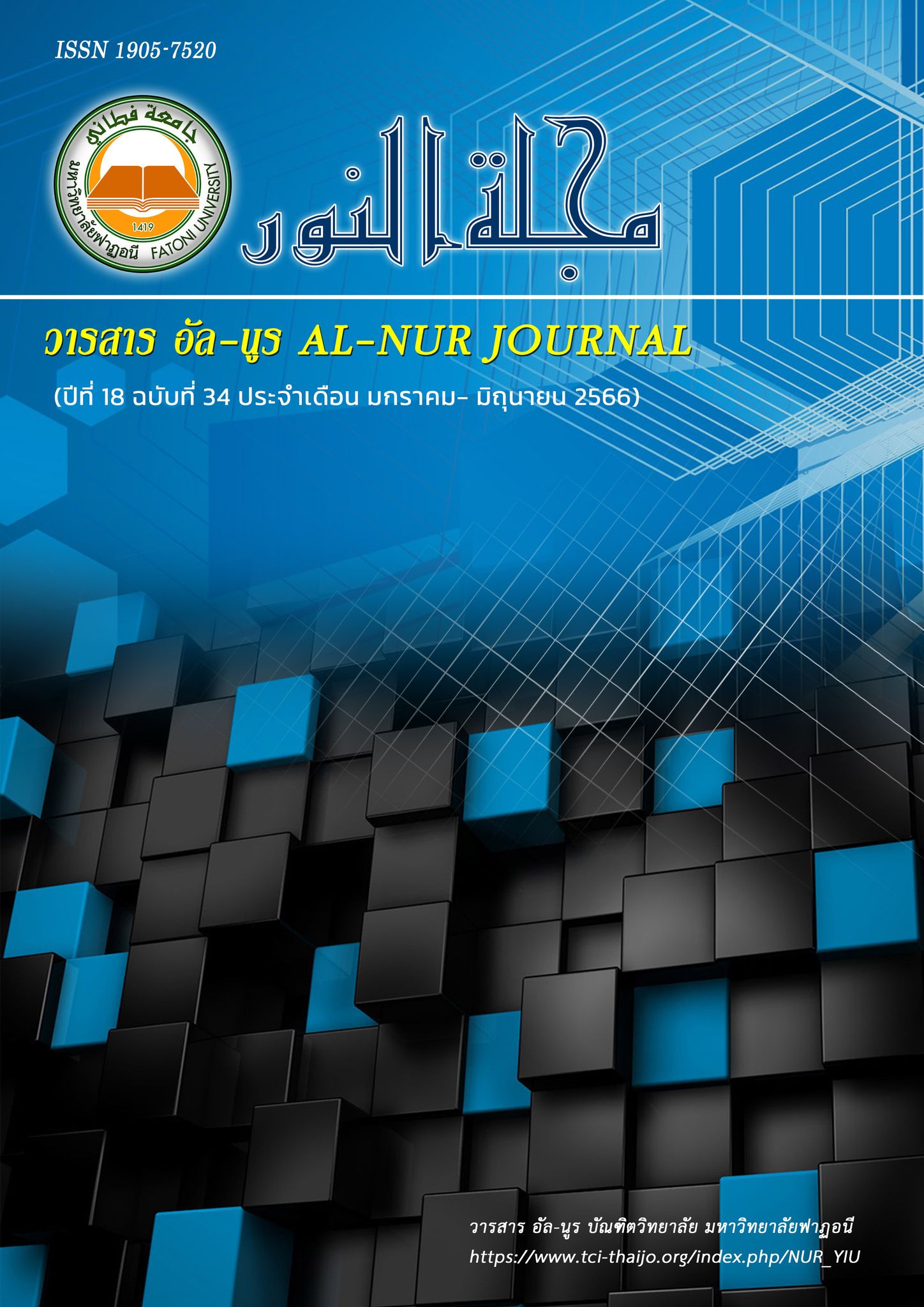C.Curriculum Development การพัฒนาหลักสูตรตามกรอบแนวคิดปรัชญาการศึกษาอิสลาม
คำสำคัญ:
การพัฒนาหลักสูตร, ปรัชญาการศึกษาอิสลามบทคัดย่อ
บทคัดย่อ
ปรัชญาการศึกษาอิสลามถือเป็นศาสตร์สาขาหนึ่งของอิสลามศึกษาและเป็นวิทยาการที่จะสร้างความยืดหยุ่นแห่งปัญญาประจักษ์ระหว่างแนวคิดเชิงเหตุผล และหลักศรัทธาของอิสลาม (ความเชื่อ) ซึ่งเป็นพื้นฐานของหลักการเรียนรู้ในศาสตร์ต่าง ๆ ด้วยเหตุผลของความจริงอันเที่ยงแท้ ด้วยคำกล่าวที่ว่าความจริงก็คือคุณสมบัติของความจริงอันเที่ยงแท้และสิ่งที่เรียกว่าจริงคือ ความจริงเชิงประจักษ์ หรือ สัจสัมพันธ์“Absolute truth”และสิ่งที่ถูกต้องถือเป็นความจริงโดยตัวของมันเอง ซึ่งเรียกว่า “สัจธรรม” ส่วนสิ่งที่เป็นความจริงของวัตถุนั้นเรียกว่า “สัจวัตถุ”การที่จะค้นพบความจริงได้นั้นจะต้องใช้หลักการของความเชื่อบนพื้นฐานสัจธรรมแห่งความจริงที่คงทนถาวรโดยบทความวิชาการนี้มีวัตถุประสงค์เพื่ออธิบายแนวคิดและปรัชญาอิสลามที่สัมพันธ์กับปรัชญาสากลเพื่อเปรียบเทียบหลักความเชื่อมั่นของอิสลามบนพื้นฐานความจริงประจักษ์เชิงรูปธรรมและสัจธรรมซึ่งเกิดจากการใช้ปัญญาประจักษ์ตามหลักการอิสลาม อันประกอบด้วย 3 หลักการสำคัญ คือ อิสลาม อีมาน และอี๊ยะซาน ด้วยหลักการข้างต้นจึงเป็นพื้นฐานของการกำหนดหลักการประจักษ์เชิงปัญญาซึ่งถือเป็นกระบวนการทางสติปัญญาในการเรียนรู้ของมนุษย์ตามหลักสัจธรรมตามหลักปัญญาประจักษ์แห่งความเชื่อมั่นของอิสลาม 3 ระดับ คือ อิลมุยากีน (Ilmu al-Yakin), อัยนุลยากีน (Ainu al-Yakin), และฮักกุลยากีน (Hakku al-Yakin) เพื่อเป็นบรรทัดฐานของการเรียนรู้ที่มุ่งเน้นการเสริมสร้างความรู้และสติปัญญาจนบรรลุเป้าหมายของการจัดการเรียนรู้ได้อย่างมีประสิทธิภาพของเยาวชนต่อไป
เอกสารอ้างอิง
Al-Quran al-Karim.
Ali Mhd.Alawi, (2014). The reading of the Holy Quran. Al-rybat university.
Al-Edrus, Syed Muhammad Dawilah. (1993). Jaafar Abdul Rahim (terj.). 1999. Epistemologi Islam: Teori Ilmu dalam al-Quran. Cet. 2. Kuala Lumpur: Dewan Bahasa dan Pustaka.
Ismail Hj Ibrahim & Mohd. Sahri Abdul Rahman (pyntg.). (1994). Ilmu dan Kecemerlangan dari Perspektif Islam. Kuala Lumpur: Institut Kefahaman Islam Malaysia.
al-Attas, Syed Muhammad Naquib. (2007). A Brief Review of Fairies of Knowledge and Views of Nature. Pualau Pinang: Universiti SainsMalaysia.
Ghazali Darussalam. (2001). Sumbangan Sarjana dalam Tamadun Islam. Kuala Lumpur: Utusan Publication.
Ibn Majah, Muhammad ibn Yazid al-Qazwini. (T.th). Sunan Ibn Majah (Muhammad Fu’ad ‘Abd al-Baqi, tahkik). Bil.220. Beruit: Dar al-Fikr.
al-Qurtubi, Muhammad ibn Ahmad ibn Abi Bakr. (1953a). al-Jami‘ li-Ahkam al-Qur’an. Kaherah: Dar al-Sha‘bi.
Syafieh, (2013). PendidikanIslam. SISTEMATIKA PENERAPAN PENDEKATAN NAZRIYYAH AL-WAHDAH. https://syafieh.blogspot.com/2013/03/sistematika-penerapan pendekatan.html
Rusmanhaji, (2013). Imamal-Ghazalidan Falsafah
https://rusmanhaji.wordpress.com/2013/12/22/imam-al-ghazali-dan-falsafah
Suhaiza Shuib, (2012). Falsafah pendidikan islam.
https://www.slideshare.net/SuhaizaShuib1/falsafah-pendidikan-islam
al-Edrus, Syed Muhammad Dawilah, (1993). Jaafar Abdul Rahim (terj.). 1999. Islamic Epistemology: The Theory of Knowledge in the Quran. Cet. 2. Kuala Lumpur: Dewan Bahasa dan Pustaka.
Ismail Hj Ibrahim & Mohd. Sahri Abdul Rahman (pyntg.), (1994). Knowledge and Excellence from Islamic Perspective. Kuala Lumpur: Institute of Islamic Understanding Malaysia.
Zawawi Hj Ahmad, (1996). Science in Islamic Education. Kuala Lumpur: Dewan Bahasa dan Pustaka
Ghazali Darussalam, (2001). Master's Contribution in Islamic Civilization. Kuala Lumpur: Utusan Publication.
Kedah Darul Aman Education Department, (1999). Knowledge Revealed by the Quran and al-Hadith. Alor Setar: Helda Business.
Latifan Arifin (pyntg.) (28 January 2019) .'Science Needs to Master Philosophy, Integration of Modern Knowledge and Science' in Religious Articles. Berita Harian.
Ismail Hj Ibrahim & Mohd. Sahri Abdul Rahman (pyntg.), (1994). Knowledge and Excellence from Islamic Perspective. Kuala Lumpur: Institute of Islamic Understanding Malaysia.
Wan Mohd Nor Wan Daud, (2005). Islamic Educational Philosophy and Practice Syed M. Naquib al-Attas: A Description of the Concept of Islamization. Kuala Lumpur: University of Malaya.
ดาวน์โหลด
เผยแพร่แล้ว
ฉบับ
ประเภทบทความ
สัญญาอนุญาต
ลิขสิทธิ์ (c) 2023 Muhamassakri Manyunu; Suhaymi Khami

อนุญาตภายใต้เงื่อนไข Creative Commons Attribution-NonCommercial-NoDerivatives 4.0 International License.
Proposed Creative Commons Copyright Notices


